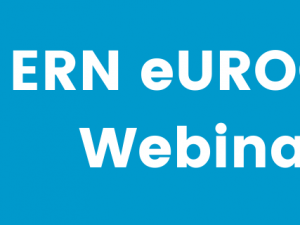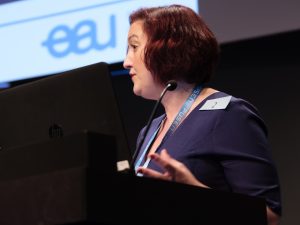ERN eUROGEN, the European Reference Network (ERN) for rare uro-recto-genital diseases and complex conditions, has successfully resubmitted its application to the European Commission (EC) for a Direct Operational Grant to fund the coordination, management, and operational activities of the ERN from October 2023 – 2027.
The proposal was originally submitted in June 2023, but the European Commission asked all 24 ERNs to revise their proposals to include two additional work packages relating to Ukraine.
The specific objectives under this grant (aligned to none work packages) will be:
1) To progress ERN development, cohesion, and engagement. (WP1 – Coordination)
An ERN Development Plan will be created as a strategic document outlining the evolution of the ERN over the four years and seven work packages, including capacity building and the development of members. Specific attention will be paid to collaborations with Ukraine. Annual risk assessments will be performed, as well as annual surveys to check training needs, capacity building needs, satisfaction, and involvement/engagement in network activities. ERN eUROGEN’s existing Performance Indicator System, which has been in place since 2018, will be continuously developed, and indicators will be collected, validated, and reported on as required. The governance structure will be maintained and revised/updated as necessary. Protocols relating to terminating non-active members, creating consortia, setting/revising network-specific criteria for expertise areas, global collaboration, and integrating Affiliated Partners will all be updated and implemented as appropriate. ERN eUROGEN will continue collaborating with the EC, other ERNs, and external stakeholders and holding regular internal and external meetings with full transparency.
2) To disseminate various results across various audiences, increasing awareness on specific issues, etc. (WP2 – Dissemination)
An ERN eUROGEN Dissemination Plan will be produced relating to the dissemination of results across various audiences to increase awareness on specific issues, producing dissemination materials (materials for medical personnel/patients, guidelines, training courses, information webinars (dedicated to raising awareness), etc.) and using various dissemination channels (website, printouts, newsletters, scientific journals, general press, international conferences, etc.).
3) To organise monitoring (indicators) in close relationship with DG SANTE and perform specific evaluations (training courses, registry usage, etc.). (WP3 – Evaluation)
ERN eUROGEN will create a Quality Improvement Group (QIG) to implement the quality improvements recommended following the first five-year evaluation of the ERNs conducted earlier this year and will continue developing its Performance Dashboard, completing data collection, reporting on indicators, and participating in the cross-ERN Working Group on Monitoring. The ERN eUROGEN website and webinars will be given in-depth evaluation, and when identified as a need for a particular expertise area, ERN eUROGEN will work with Orphanet to update the classification of the rare disease and the coding.
4) To enhance the use of the “new CPMS” (WP4 – Healthcare and CPMS)
ERN eUROGEN will focus on expanding the provision of highly specialised virtual multi-disciplinary advice on patients with rare uro-recto-genital diseases or complex conditions using the Clinical Patient Management System (CPMS) and increasing the number of patient cases discussed using the platform, encouraged by the implementation of expert reimbursement scheme for giving expert advice. ERN eUROGEN has been providing input relating to the new version of CPMS, and when it goes live, the ERN will ensure that all identified CPMS experts are signed up to the system, have an active account, and are given training. ERN eUROGEN will also investigate how to carry out virtual consultations with Ukrainian healthcare professionals if approval to use CPMS cannot be provided.
5) To increase the number of registry patients and enhance the use of the registry. (WP5 – Registries, data management and analysis)
The ERN eUROGEN registry went live in January 2022 and collects standardised, long-term data on patients with rare uro-recto-genital diseases or complex conditions. Currently, >400 patients have been entered. ERN eUROGEN will continue guiding HCPs in obtaining ethical and legal approval for registry implementation, developing data elements, selecting PROM questionnaires, designing eCRFs and surveys, facilitating/motivating data entry, enabling data sharing, FAIRifying the ERN eUROGEN registry and other registries and making them interoperable, and mapping the use of ORPHAcodes. All of the medical data collected by all 24 ERN registries will also be used to test the European Health Data Space, where medical data can be safely used with the full informed consent of the patients for secondary purposes like research.
6) To increase the offer of training courses and enhance the knowledge of various professional categories. (WP6 – Training & Education)
ERN eUROGEN will co-develop a flagship highly specialised surgical training programme including workshops and courses, produce highly specialised surgical videos, facilitate clinical training at network HCPs, emphasise the importance of transitional care, produce a consensus document on quality of life, continue its webinar programme, and publish a book on rare and complex urology.
7) To increase the body of knowledge concerning the need for new Clinical Practice Guidelines (CPGs), to increase the number of published CPGs for rare diseases and increase the number of produced Clinical Decision Support Tools (CDSTs). (WP7 – CPGs and CDSTs)
This will be a priority work package for our ERN going forwards. ERN eUROGEN will enable the groups already at work to complete CPGs on anorectal malformations and paediatric neurogenic bladder and begin collaborative work on the following topics:
- CPGs: bladder exstrophy, rare bladder inflammatory conditions, adrenal tumours,
- CDSTs: congenital solitary functioning kidney, posterior urethral valves, megaureters, vaginal malformation, vesicovaginal fistula, consensus-driven recommendations for implementing centralisation of penile cancer.
The intention is to collaborate with our Supporting Partners like the European Association of Urology, which has so much expertise in guideline development, to avoid duplication of effort, maximise the use of resources, and disseminate the results of this work as widely as possible.
8 & 9) To develop cooperative activities with and support for Ukrainian competent authorities and healthcare units, contributing to capacity building and best practice sharing with Ukraine. (WP8 – Capacity building and best practice sharing for Ukrainian competent authorities and healthcare units and WP9 – Other activities for Ukrainian competent authorities and healthcare units)
ERN eUROGEN will consolidate its links with the Rare Diseases Hub Ukraine and deepen its collaborations with OMNI-Net, the Khmelnytsky City Children’s Hospital in Ukraine, and the International Federation for Spina Bifida and Hydrocephalus (IFSBH) to address the urgent needs of the relatively high numbers of paediatric patients with spina bifida in Ukraine. If possible within EU regulations, ERN eUROGEN will also facilitate CPMS access and panel discussions for clinicians in Ukraine and allow Ukrainian HCPs to join and contribute to the ERN eUROGEN Registry.
Conclusion
In conclusion, the future looks bright for the ERNs as they enter an even more active implementation phase of operations after their enlargement with new members in 2022. The five-year cycle of the independent evaluation of the ERNs and their healthcare provider members will end in 2023, and improvements will be made based on their recommendations.
The importance of the sustainable long-term funding provided by the European Commission cannot be underestimated, and all 24 ERNs are expected to flourish over the next grant period until 2027. We will let you know as soon as we hear the outcome of the proposal from the EC – information on evaluation results is expected by the end of 2023.




